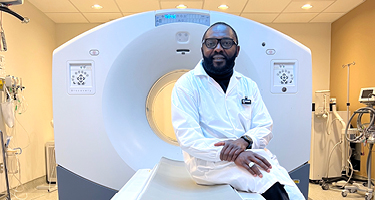
Father. Brother. Husband. Son. In a room of nine men, it is estimated that at least one of them will develop prostate cancer during their lifetime. In a larger gathering, it is estimated one in 29 will die from it.
A Royal University Hospital Foundation donor-funded clinical research trial has begun that merges our community’s expertise in cancer research and care, and nuclear medical imaging to enhance diagnosis and treatment for those living with the most aggressive form of prostate cancer.
Jim and Lisa Yuel have generously donated $250,000 to support the trial that will involve up to 500 patients from across Saskatchewan who have biopsy-proven prostate cancer. The study consists of two cohorts of high-risk prostate cancer patients who have not received any definitive treatment and those with biochemical reoccurrence postprostatectomy or post-radical radiotherapy.
The RUH-based study, one of only a handful being conducted across the country, seeks to confirm the value of a new intravenousadministered tracing agent, Ga-68 PSMA (prostate-specific membrane antigen), that when viewed by a PET (positron emission tomography) scan “lights up” the smallest of prostate cancer cells anywhere in the body, which is a major challenge with the current standard of care imaging tests.
“The Yuels’ generosity will help to bring new hope and help improve the lives of so many men in our province,” says RUH radiopharmacist, associate professor, and research lead Dr. Humphrey Fonge.
“If our trial results are consistent with findings elsewhere, Saskatchewan and RUH will be well-positioned in trialing a recent Health Canada-approved injectable drug that kills off cancer cells,” adds Dr. Fonge.
Although Jim Yuel has never had a prostate issue, the Yuel’s know many men whose lives have been impacted by prostate cancer.

Jim and Lisa Yuel
“Even with effective and successful surgery the long-term impact is life-altering,” says Jim. “If our gift improves outcomes for those dealing with prostate cancer, then it is well worth the investment regardless of cost.”
Prostate cancer is typically first detected through a prostate-specific antigen (PSA) blood test, which indicates the presence of the cancer but can’t tell whether it is localized in the prostate or if it has spread to other organs. Traditionally, elevated PSA levels are followed by a prostate biopsy to confirm or rule out cancer. If prostate cancer is confirmed various treatment options are available. However, its spread cannot easily be detected with CT scans or other imaging tests.
Dr. Fonge’s research is examining the new PSMA PET imaging scan technique that requires patients to receive a low dose intravenous injection of the radioactive “tracer” agent Ga-68 PSMA that locates and attaches itself to a protein often found in large amounts on prostate cancer cells. Ga-68 PSMA emits gamma rays, similar to X-rays, that reliably tag prostate cancer cells that may have travelled elsewhere and light up when a whole-body scan is done, giving a clear image of exactly where the prostate cancer is in a person’s body.
When given a Ga-68 PSMA PET scan some studies have found between 30 to 40 percent of patients believed to have “beaten” the cancer actually had prostate cancer cells spread to other parts of the body. For the patient, this means that instead of getting a prostatectomy or radiation to just the prostate and assuming they are fine, they would know the cancer is in other places and will need to be treated as such.
“Seeing cancer elsewhere a lot sooner allows us to provide an appropriate treatment plan a lot quicker,” says Dr. Fonge. “On the flip side, a clear PSMA scan is a great indicator that the prostate cancer has not spread.”
Thanks to the support of donors like Jim and Lisa Yuel, and the dedicated work of researchers, clinical teams and patients who opt to participate in clinical trials, we are advancing our understanding of debilitating illnesses and injuries that contribute to a healthier tomorrow for the people of Saskatchewan.
Read more stories about the impact of your donations in our 2022–2023 Annual Gratitude Report.



